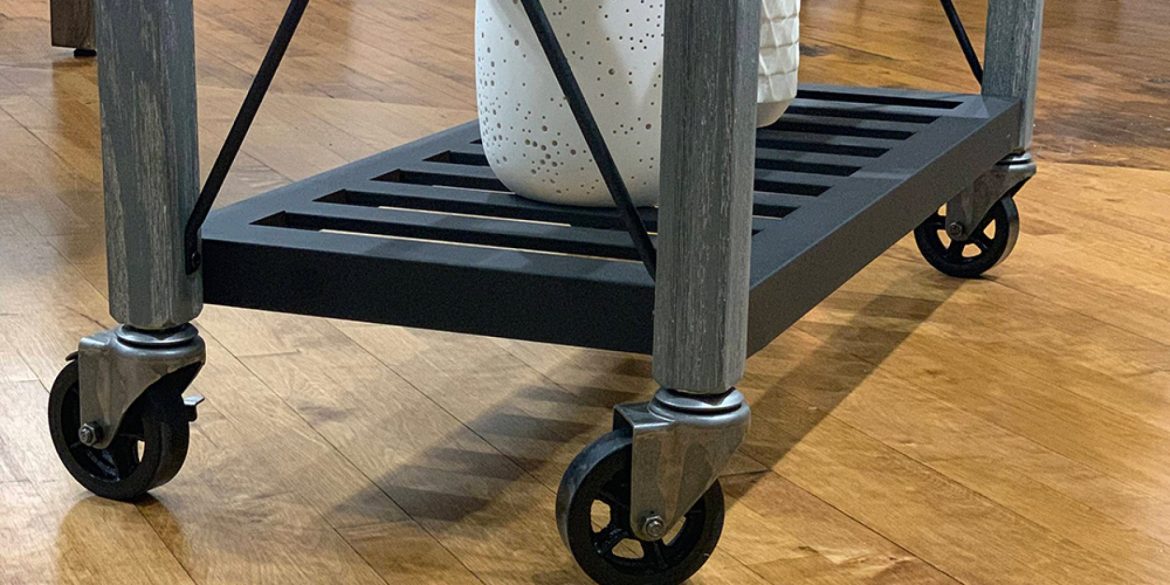Caster wheels are often overlooked, but when chosen incorrectly, they can cause serious damage to your floors. Whether you’re outfitting carts, equipment, or furniture — understanding how to choose floor-safe casters can save you thousands in repairs and keep your workspace safe and efficient.
Why This Matters
Caster wheels don’t get their due credit. From hospital trolleys to warehouse carts, they make movement easy — but the wrong type can cause dents, scratches, scuffs, and permanent marks on expensive flooring.
In this guide, we break down the 5 essential caster wheel features that reduce floor damage — and we’ve added 3 bonus tips that are often overlooked but highly effective.
1. Soft, Non-Marking Wheel Material
Why it matters:
Hard wheels (like steel or hard nylon) can scuff or gouge flooring, especially when rolling over seams, debris, or delicate surfaces.
What to choose:
- Thermoplastic Rubber (TPR)
- Polyurethane wheel
- Soft Rubber
- PVC
- UHMW Polymer
These materials roll quietly, reduce friction, and are far less likely to leave marks.
Best for: Hardwood, Laminate, Tile, Epoxy-coated concrete
2. Wide Tread Design
Why it matters:
Narrow wheels create high point loads, which can leave pressure marks or wear grooves over time. Wider wheels distribute weight more evenly.
What to choose:
- At least 2-inch tread width
- Dual-wheel casters for enhanced weight distribution and easier pivoting
Best for: Offices, Warehouses, Hospitals, Commercial Kitchens
3. Floor-Safe Wheel Bearings
Why it matters:
Worn or low-grade bearings lead to jerky movement, dragging, or wobbling — all of which increase floor stress.
What to choose:
- Ball bearings for swivel casters
- Sealed or shielded bearings to prevent dust buildup
- Smooth, consistent rolling reduces friction and scratching
Best for: Hospital beds, Lab equipment, Display racks, Mobile workstations
4. Swivel Radius and Brake Design
Why it matters:
When heavy trolleys take sharp turns or stop suddenly, swivel casters may drag across the floor, causing gouges — especially if brakes are partially engaged.
What to choose:
- Large swivel radius for smooth turning
- Total-lock brakes (locks both wheel & swivel)
- Directional locks to keep movement straight and reduce fishtailing
Pro Tip:
Before moving the trolley, always ensure brakes are fully released. Dragging a partially braked wheel is a common cause of floor damage.
Best for: Retail displays, Lab trolleys, Food service carts, AV equipment
5. Load Capacity Per Wheel
Why it matters:
Overloading causes wheels to deform or lock, which leads to dragging and surface damage.
What to choose:
- Match the rated load per caster to your real-world use
- Account for weight shifts, especially on uneven floors or inclines
- For heavy loads, increase the number of wheels to distribute weight
Best for: Tool trolleys, Production line carts, Medical equipment, Heavy-duty racks
Bonus Section: 3 Overlooked Features That Also Protect Your Floors
These additional features often go unnoticed — but they’re key to long-term floor protection.
A. Shock Absorption
- Why it matters: Reduces impact from bumps, thresholds, or debris
- Best for: Cleanrooms, Hospitals, Electronics handling
B. Clean, Debris-Free Wheels
- Why it matters: Embedded stones or metal can scratch flooring
- Tip: Choose sealed treads and clean wheels regularly
C. Floor-Specific Wheel Material
- Why it matters: Even soft wheels must be matched to the surface
- Examples:
- PU for tile/epoxy
- Rubber for wood
- Nylon for concrete
Final Thoughts: Choose Smart. Protect Your Floors.
Whether you’re managing a hospital, office, retail store, or industrial floor — damaged flooring is expensive to repair and disruptive to operations.
The good news? The right caster wheel can completely eliminate this risk.
Visit Our site Muvallcastors.com today to find the right caster to your floor type, equipment, and usage environment. A small decision today can protect your floors for years to come.
Quick Summary: What to Look for in Floor-Safe Casters
Feature Why It Helps
Soft, non-marking wheels Avoids scuffs and scratches
Wide tread design Distributes weight, prevents dents
Quality bearings Enables smooth, drag-free movement
Swivel & brake design Reduces gouging during turns/stops
Proper load capacity Prevents deformation and dragging
(Bonus) Shock absorption Reduces impact and vibration
(Bonus) Clean wheels Avoids accidental scratching
(Bonus) Floor-specific choice Ensures compatibility with surface

